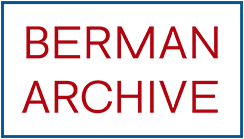December brings Hanukkah, time off, and the annual Association for Jewish Studies Conference. This year it was in San Francisco, and while Berman Archive Director Ari Y Kelman participated in a number of panels, Deputy Director Adam Jacobson took in all the archive-related panels. Here are some highlights.
Jewish Archives in the US
While many big Jewish archives exist in our big coastal cities and Jewish population centers, there are a lot of archives across the country doing compelling and important work. The “Expanding Jewish Archives In The United States: Power, Limits, Possibilities” panel highlighted some of these archives and their stewards. Here’s a rundown:
Katie Dietrick is the archivist at the University of Minnesota’s Upper Midwest Jewish Archives. The archive’s core users are members of the community and the most used collection relates to North Dakota homesteading. They also hold the most extensive collection of the Soviet Jewry Action Newsletter.
Abigail Glogower is the curator of Jewish Collections at the Filson Historical Society, preserving and exploring the history of the Jewish experience in Louisville, Kentucky, and the Ohio Valley region. Glogower flagged this issue of self censorship of Jewish (and other minority groups) contributions to the archive in the service of triumphalist narratives.
Joshua Furman shared his experience as the curator of the South Texas Jewish Archives at Rice University. He spoke of the “startup mentality” he and his colleagues took to building out the collections, along with the need to educate and do outreach around what an archive is and how it operates. Furman also wrote a column for the local Jewish newspaper as a way to connect with and educate his community.
Takeaway: There’s so much good work, history, artifacts, and stories about the American Jewish experience all over this country and we need to seek out these kinds of archives out whenever we can.
Antisemitism in the Archive
Deborah Dash Moore convened a panel spanning instances of antisemitism evident in archival material across four decades: the 1930s, 40s, 50s, and 60s. The Berman Archive’s own Ari Y Kelman presented his research on antisemitism in Stanford’s admissions in the 1950s and 1960s. Riv-Ellen Prell shared her research into antisemitism at the University of Minnesota Dental School in the 1930s. Brittany P Tevis forwarded a framework that considers whether or not someone’s rights were impinged rather than whether or not they experienced antisemitism, a concept that is much harder to define, especially when looking back at an archive.
In her response to the three talks, Lila Corwin Berman laid out a helpful framework for assessing antisemitism in the archive: epistemological (how we know what we know), motivational (why are we looking for it), definitional (what the materials are defining, how categories are deployed, and how interactions with Jews are classified).
Takeaway: you have to know what you’re looking for, but also you need to know how to look when it comes to antisemitism. Because antisemitic discrimination can take so many forms, so much is left to interpretation, savvy search terms, and a deep understanding of the subject and context.
Archive of the Jewish American Left
There was also a great roundtable discussion centered on the newly formed Archive of the American Jewish Left in the Digital Age at NYU. Lila Corwin Berman, a supervisor and advisor on the project shared some of the inspiration for launching the project, recognizing the precarity of digital records that define the foundation of active Jewish organizations.
Sandra Fox, the archive’s director, described the process of collecting its initial holdings, which focus on Jewish Currents and comprise the magazine’s documents and 60 oral histories covering its existence since its relaunch in 2018. The archive is also collecting the documents of Open Hillel (now called Judaism on Our Own Terms), a college student-led initiative that focused on fostering inclusive Jewish communities surrounding Israel-Palestine politics. Rachel Deblinger, director of the Modern Endangered Archives at UCLA, shared some relevant case studies from her work archiving at-risk, politically sensitive materials around the world.
Takeaway: This new archive is already doing the important, tricky work of documenting digital-native organizations and we look forward to engaging with their holdings and seeing what they collect in the future.
From the perspective of the Berman Archive’s work, it was energizing to engage with scholars, archivists, and practitioners who have a real stake in the work we do. We’re at a global inflection point for Jews and it’s heartening to see so many great ideas, thoughtful responses, and the inspiring breadth of work happening in the Jewish Studies space.

